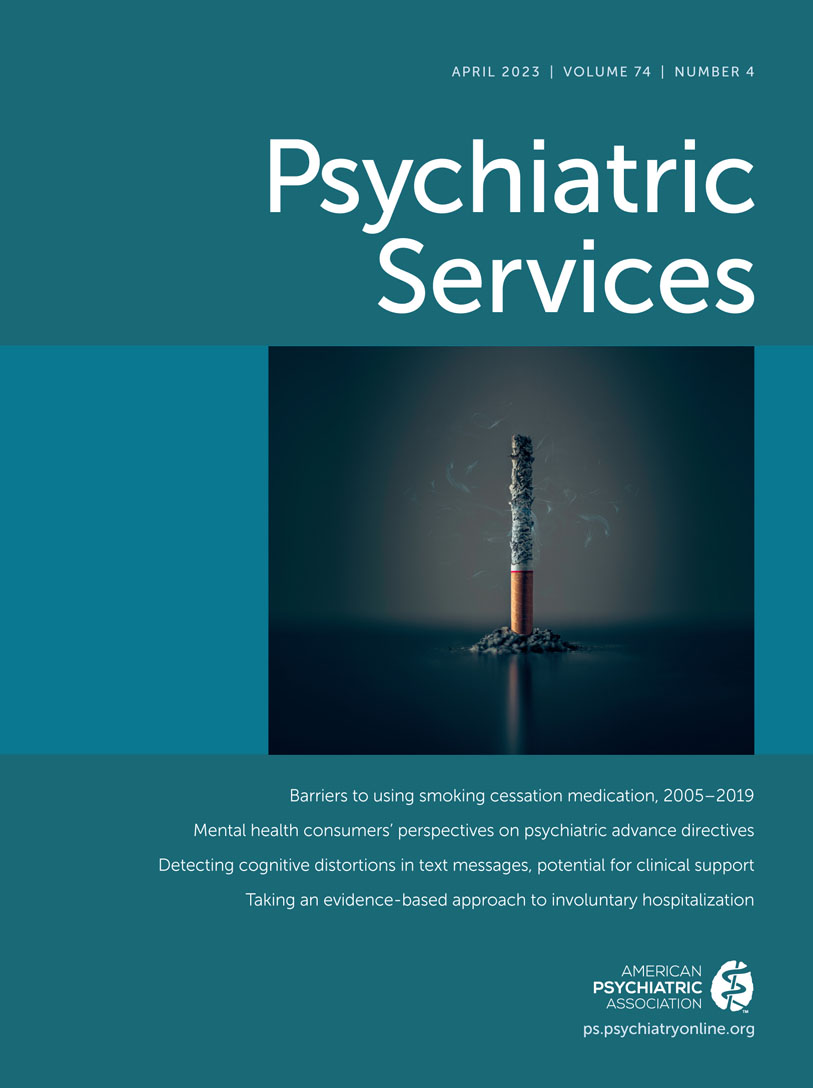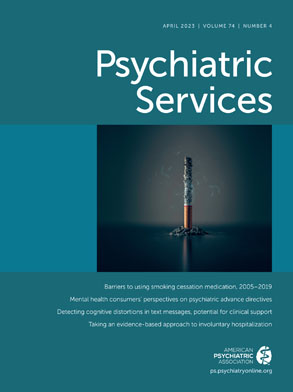Expert clinical consensus guidelines call for clinicians to offer a prescription to all patients who smoke tobacco; to provide strong, clear, and personalized advice to patients to quit as soon as possible; and to proactively connect patients to behavioral support for tobacco smoking cessation (
1). This guidance is rooted in the recognition that tobacco smoking is a chronic substance use disorder caused by addiction to nicotine. Pharmacotherapy for smoking cessation is recommended for all who smoke tobacco and will accept such therapy, regardless of their readiness to quit, and with rare exception. By reducing both withdrawal symptoms between episodes of cigarette smoking and the reward experienced during smoking, pharmacotherapy can reduce the frequency of smoking and increase confidence in one’s ability to quit, culminating in cessation attempts by those who thought they were not ready to quit smoking right away.
White and colleagues (
2) examined a nationally representative sample within Medical Expenditure Panel Survey data, compiled by the National Center for Health Statistics, from 2005 to 2019. The authors reported that almost all smokers with or without a mental illness or serious mental illness did not receive the first-line smoking cessation pharmacotherapies of varenicline or dual-form nicotine replacement therapy. Their finding that fewer than 3% of smokers received varenicline, arguably the most effective smoking cessation pharmacotherapy (
3), or nicotine replacement therapy was consistent from 2005 to 2019.
Low rates of delivery of guideline-concordant treatment for tobacco use disorder to people with serious mental illness are of particular concern given the high prevalence of tobacco smoking, adverse social determinants of health, and the 25- to 30-year mortality gap (vs. people without mental illness) among individuals in this population. Large studies have demonstrated that the presence of comorbid mood, anxiety, or psychotic disorders does not substantially affect the efficacy of smoking cessation pharmacotherapy when combined with behavioral support for abstinence (
3–
5). Abstinence rates without pharmacotherapy are particularly low in smokers with serious mental illness (
6), making it imperative that evidence-based smoking cessation treatment, including first-line pharmacotherapy, be implemented as the standard of care.
System- and provider-level strategies to incorporate evidence-based smoking cessation treatment into standard workflows are needed to increase delivery of smoking cessation medication to people with and people without mental illness who are addicted to smoked nicotine. White and colleagues (
2) interviewed internists and psychiatrists to identify barriers to the provision of such care. Physicians’ misconceptions about pharmacotherapy were prevalent, including that their patients who smoke, particularly those with mental illness, are not motivated to quit and that smoking cessation risks worsening psychiatric symptoms or destabilizing psychiatric illness. Reports are consistent that most smokers—both those with and those without mental illness—would like to quit smoking and in fact have tried to quit smoking on their own in the past year, and that smoking cessation is associated with reduced anxiety, depression, and stress and improved psychological quality of life and positive affect (
5,
7). Provision of smoking cessation pharmacotherapy to all who smoke tobacco as the standard of care, regardless of patients’ readiness to quit, is hypothesized to double abstinence rates among those with serious mental illness (
8) and to work via the mechanisms of increasing motivation to quit (by reducing nicotine withdrawal symptoms and reward) and of blunting symptoms such as depressed mood or agitation that can arise with nicotine withdrawal and mimic symptoms of psychiatric illness.
Several strategies show early promise to increase delivery of first-line pharmacotherapy for tobacco use disorder and improve smoking cessation outcomes for those with and those without mental illness, and the strategies warrant implementation testing in real-world clinical settings. These strategies include education, support, proactive outreach, and behavioral economics–informed feedback to physicians. Our group recently showed that community health worker support for patients, combined with provider education to their physicians, increased smoking abstinence rates among people with serious mental illness, an effect that was mediated in part through increased prescription of varenicline (
8). Behavioral economics approaches to encourage physicians to consistently deliver guideline-concordant pharmacotherapy for tobacco use disorder to their patients have shown promise to increase prescriptions and abstinence rates in psychiatric settings. Implementation trials of strategies to achieve both outcomes are warranted. Development of education interventions is needed to produce scalable strategies to ameliorate the provider education barriers described by White and colleagues (
2) and others. These barriers include prevalent beliefs that smoking cessation will destabilize psychiatric illness; lack of confidence in knowledge of best practices for tobacco use disorder treatment; unfamiliarity with the best-practice recommendation to offer first-line pharmacotherapy to all smokers, regardless of their readiness to quit; and general overestimation of the risk to patients of pharmacotherapy for tobacco use disorder relative to the risk of failure to treat tobacco use disorder (
9). Policy shifts to remove system-level barriers to care, such as low or no provider reimbursement for tobacco use disorder treatment as well as prior authorization requirements to prescribe and high copayments to receive varenicline, are also needed to increase the feasibility and impact of the provision of first-line pharmacotherapy for tobacco use disorder.

